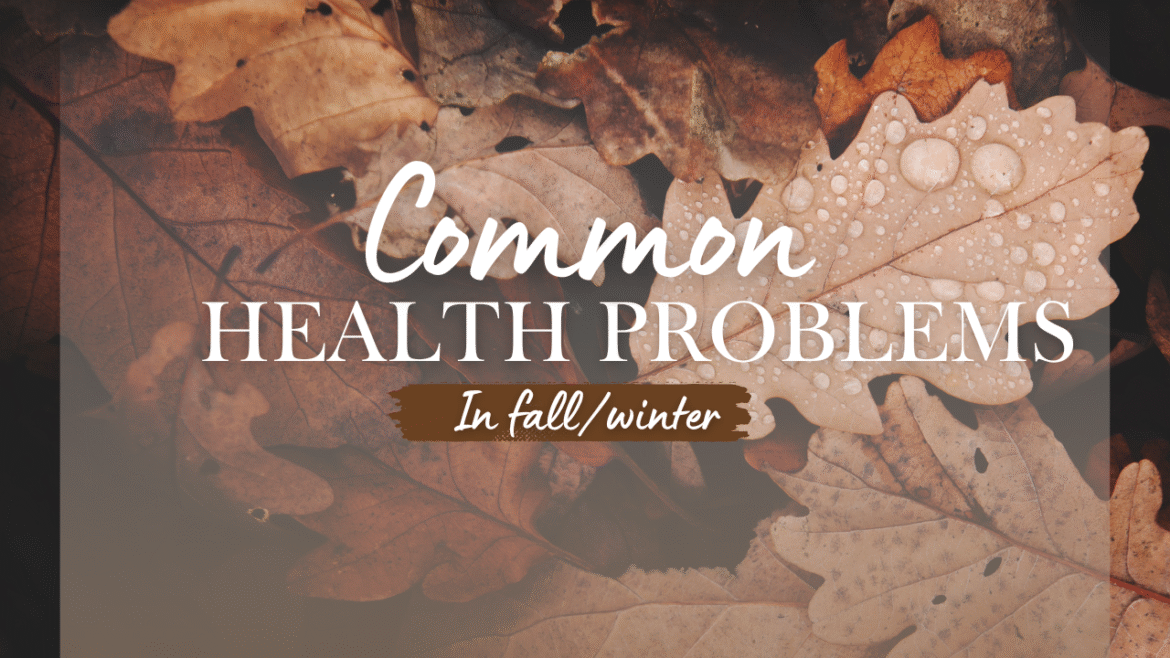Fall and winter bring cozy sweaters, hot drinks, and festive celebrations. But while these seasons have their charm, they also present a unique set of health challenges. The colder weather, reduced daylight, and holiday lifestyle changes can take a toll on both physical and mental well-being. Recognizing the most common health problems that arise during these months can help you prepare and take preventive steps. Here are the top health issues people often face in fall and winter—and what you can do about them.
1. Colds and the Flu
As temperatures drop and people spend more time indoors, viruses spread more easily. The fall and winter months are notorious for colds and seasonal flu. Symptoms like sore throat, cough, congestion, fever, and fatigue can disrupt daily life. The best defense is prevention. Washing hands frequently, avoiding close contact with sick individuals, and disinfecting high-touch surfaces can reduce the risk of infection. Getting an annual flu shot is also one of the most effective ways to protect yourself and others. If you do catch a cold, rest, hydration, and over-the-counter remedies usually help ease symptoms.
2. Seasonal Allergies
Many assume allergies are only a springtime issue, but fall has its own triggers. Ragweed pollen is a common allergen in autumn, and mold spores thrive in damp leaves and cooler weather. These can cause sneezing, watery eyes, congestion, and headaches. To minimize symptoms, monitor local pollen counts, keep windows closed on high-pollen days, and shower after being outdoors. Using an air purifier at home may also help. Over-the-counter antihistamines can relieve mild symptoms, but persistent issues may require medical attention.
3. Asthma Flare-Ups
Cold air is a well-known trigger for asthma attacks. Fall and winter often bring sudden temperature changes, which can irritate airways. Respiratory infections during these seasons can further worsen symptoms. Asthma sufferers should always carry their inhaler and follow their prescribed treatment plan. Covering your nose and mouth with a scarf in cold air can also reduce irritation. Regular check-ups ensure that your asthma management plan remains effective throughout the colder months.
4. Dry Skin and Eczema
The drop in humidity during fall and winter leads to dry, itchy skin. For some, this worsens into eczema flare-ups, causing redness, irritation, and discomfort. Indoor heating can make dryness even more severe. To keep skin healthy, moisturize daily with a fragrance-free lotion, avoid long hot showers, and use a humidifier to add moisture to indoor air. Wearing gloves and protective clothing outdoors can also help prevent irritation from wind and cold.
5. Joint Pain
Many people notice increased joint pain and stiffness during colder months. Conditions like arthritis often worsen in fall and winter, possibly due to drops in barometric pressure or reduced physical activity. Staying active, doing light stretching, and maintaining a healthy weight can ease joint stress. Warm baths, heating pads, and layered clothing can also provide comfort. In severe cases, consulting a healthcare professional for pain management strategies is recommended.
6. Seasonal Affective Disorder (SAD)
With shorter days and reduced sunlight, fall and winter can bring about Seasonal Affective Disorder (SAD), a type of depression linked to seasonal changes. Symptoms include low energy, irritability, difficulty concentrating, and changes in sleep or appetite. Spending time outdoors in natural daylight, even for short walks, can help. Light therapy lamps that mimic sunlight exposure are often effective. Staying socially connected, eating a balanced diet, and maintaining a regular sleep schedule are also beneficial. For severe or persistent symptoms, professional help may be necessary.
7. Weakened Immune System
Colder weather itself doesn’t make people sick, but the immune system can become more vulnerable during these months. Reduced vitamin D levels from less sun exposure, combined with holiday stress and changes in routine, can weaken immunity. Supporting your immune system with a balanced diet rich in vitamins, adequate sleep, stress management, and regular exercise is key. Vitamin D supplements may also help during the darker months, but it’s best to consult a healthcare provider before starting any new regimen.
8. Weight Gain
The combination of holiday feasts, comfort foods, and less outdoor activity often leads to winter weight gain. While enjoying seasonal treats is perfectly normal, the added calories can add up quickly. Maintaining portion control, choosing healthier seasonal recipes, and staying active even indoors—through yoga, at-home workouts, or gym sessions—can help balance things out. A mindful approach ensures you enjoy festive foods without compromising your health goals.
9. Respiratory Infections
Beyond the common cold and flu, fall and winter also see a rise in bronchitis, pneumonia, and other respiratory infections. These illnesses can be more serious, especially in children, older adults, and those with weakened immune systems. Preventive measures include staying up to date with vaccines, practicing good hygiene, and seeking medical care if symptoms worsen. Prompt treatment can prevent complications.
10. Heart Health Concerns
Cold weather places additional stress on the heart. Blood vessels constrict in low temperatures, increasing blood pressure and risk of heart-related events. Shoveling snow or engaging in strenuous outdoor activity without proper preparation can be particularly risky. Individuals with heart conditions should take extra care, avoid overexertion in cold weather, and dress warmly. Regular check-ups and adherence to prescribed medications are crucial for managing cardiovascular health during fall and winter.
Conclusion While fall and winter offer cozy moments and festive cheer, they also bring specific health challenges that shouldn’t be ignored. From common colds and allergies to serious issues like asthma flare-ups and seasonal depression, being aware of these risks is the first step toward prevention. By practicing good hygiene, staying active, eating a nutrient-rich diet, and caring for both your physical and mental well-being, you can reduce the impact of seasonal health problems. With preparation and healthy habits, fall and winter can be seasons to enjoy rather than endure.
